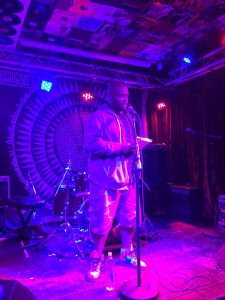What a privilege to have had Lacy M. Johnson, Kiese Laymon, and Tiphanie Yanique share the stage this past Monday for First Person Plural Harlem’s season opener. It was a profound reading– not a word to be used lightly, and we don’t.
Lacy M. Johnson‘s latest book, The Other Side, recounts the harrowing experience of  her kidnap and near murder at the hands of a former boyfriend. Johnson read of the dreams that haunt her still– the expected nightmares of threats and violence, and the perhaps more disturbing dream of sitting down to a calm, comforting conversation with the man. Through her children, Johnson showed us the lasting impact of the violence done to her. “I want her to be a little afraid of me,” she writes of her daughter, a three-year-old as irrepressible as Johnson herself was as a child. The traumatic event taught Johnson to retreat into herself, and in moving moment after moment, Johnson worries about how she closes the door on her children, forgetting how to open it again.
her kidnap and near murder at the hands of a former boyfriend. Johnson read of the dreams that haunt her still– the expected nightmares of threats and violence, and the perhaps more disturbing dream of sitting down to a calm, comforting conversation with the man. Through her children, Johnson showed us the lasting impact of the violence done to her. “I want her to be a little afraid of me,” she writes of her daughter, a three-year-old as irrepressible as Johnson herself was as a child. The traumatic event taught Johnson to retreat into herself, and in moving moment after moment, Johnson worries about how she closes the door on her children, forgetting how to open it again.
 Kiese Laymon decided to read an essay “from the heart,’ one he feels uncomfortable reading outside of his Mississippi birthplace, and we will be forever grateful that he did. “How to Slowly Kill Yourself and Others in America,” the titular essay of his recent collection, is a revelation about what it means to be a young black male in a country that is anything but post-racial. Whereas wealthy/white youth have their foibles and serious crimes alike laughed off as growing pains, Laymon writes, “I was born on parole,” and “nineteen-year-old black boys cannot be perfect in America.” And while he writes of the ways his life might have and did go terribly sideways as a young man, he also finds deep empathy for, among others, his mother, wondering how he has failed to add love and comfort to her life. The essay was a wrenching tour de force.
Kiese Laymon decided to read an essay “from the heart,’ one he feels uncomfortable reading outside of his Mississippi birthplace, and we will be forever grateful that he did. “How to Slowly Kill Yourself and Others in America,” the titular essay of his recent collection, is a revelation about what it means to be a young black male in a country that is anything but post-racial. Whereas wealthy/white youth have their foibles and serious crimes alike laughed off as growing pains, Laymon writes, “I was born on parole,” and “nineteen-year-old black boys cannot be perfect in America.” And while he writes of the ways his life might have and did go terribly sideways as a young man, he also finds deep empathy for, among others, his mother, wondering how he has failed to add love and comfort to her life. The essay was a wrenching tour de force.
Tiphanie Yanique read a section of her new novel, Land of Love and Drowning, which began with the musicality of poetry recounting the charmed life of an impossibly  charismatic man from St. Thomas who joins the US Army in the time of Jim Crow. We were spellbound as Yanique narrated a trip he and a few other “Islander” soldiers take to a restaurant near their New Orleans base. The excursion nearly ends in tragedy as the realities of violent racism slowly– almost too slowly– sink in for the young men, unused to segregation and anticipating the respect the uniform should afford. The beautiful, talented protagonist cannot believe the local men won’t listen to reason. The whole of Shrine was leaning forward throughout, to see him safely through.
charismatic man from St. Thomas who joins the US Army in the time of Jim Crow. We were spellbound as Yanique narrated a trip he and a few other “Islander” soldiers take to a restaurant near their New Orleans base. The excursion nearly ends in tragedy as the realities of violent racism slowly– almost too slowly– sink in for the young men, unused to segregation and anticipating the respect the uniform should afford. The beautiful, talented protagonist cannot believe the local men won’t listen to reason. The whole of Shrine was leaning forward throughout, to see him safely through.
 Huge thanks to DJ Lady DM spinning us on home! And thanks again to Lacy, Tiphanie, and Kiese for the work that your words do in the world. We will not soon forget this reading!
Huge thanks to DJ Lady DM spinning us on home! And thanks again to Lacy, Tiphanie, and Kiese for the work that your words do in the world. We will not soon forget this reading!
